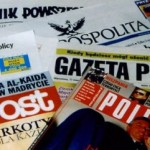PRESS REVIEW
Come back
“One fourth of European clerics study in Catholic seminaries in Poland. They are the children of their times: they know foreign languages, grew up in the world of television, hip-hop and computers. więcej...
“One fourth of European clerics study in Catholic seminaries in Poland. They are the children of their times: they know foreign languages, grew up in the world of television, hip-hop and computers.
“You don’t run politics like that, somebody spits on us and we pretend that it is just a rain shower” Jan Maria Rokita, Civil Platform leader, comment for Gazeta Wyborcza daily. Gazeta Wyborcza “Not so long ago the Sejm took up a controversial project of a resolution created by deputies from League of Polish Families (LPR) and Catholics-National Movement, which obliges the government to exact reparations from Germany for the losses suffered by Poland during World War II. The Sejm directed the project of the Act to Foreign Affairs Commission to be reconsidered. During a stormy debate in the Sejm the two concepts of the approach to this problem clashed. The representatives of the government and the Democratic Left Alliance (SLD) argues that the resolution does not have any justification in international law and can have damaging result for Polish-German relations, without bringing any measurable profits at the same time. Simply, there is more to lose than to win. On the other hand, the opposition, especially right wing, was emphatically demanding settling up with Germany of all the damage which this country caused during WWII . According to the resolution supporters, Poland has not yet received compensation for the damage caused by the occupier. It is high time to make a claim. What is characteristic is that deputies were not demanding war reparations from Russia – the USSR successor – although from September 17, 1939 Poland was occupied by two countries. Such a standpoint just goes to show that this resolution has a political and propaganda aim, and not lawful one. The confusion around war reparations is a attempt of an counterstrike against property claims of expelled Germans, who in the second half of the 1940’s were dispossessed by the Polish authorities, and now are about to demand from Poland compensations for lost properties. It is very likely that one of the Europeans tribunals – the European justice Tribunal or the European Human Rights Tribunal will decide about the right of the expelled Germans to compensations. Both Polish and German governments take the position that the claims of the expelled Germans do not have any legal grounds.
Antonii Bolecki, lawyer, September 1
* * *
“I absolutely disagree with the argument, that according to international law Polish reparation claims towards Germany do not have grounds. Adoption of such arguments would conduct to acceptance that Poland in 1945, when Potsdam Conference was taking place, and in 1953, when president Bolesław Bierut relinquished the right for reparation, was a sovereign country being able to decide about its own fate. That was obviously not true.
Besides the legal grounds, we also have moral law to demand the compensation for the sheer destruction caused by the Germans in Poland after 1939. I know, this evokes surprise, from a long time the operation of Polish politicians became used to continuous apologizing and giving the Germans moral identification, although the ratio of Polish faults towards Germans is like one to infinity. The policy carried for years was an act of insanity, because it created atmosphere of Germans putting forward further and further extensions.
Acceptance by the Sejm the resolution demanding reparations from Germany is a very important political act. It is a clear signal for Germany, that the period of softness and forbearance is over. From this point of view, passing such resolution should not wait for claims from expelled Germans to be respected by some international tribunal.”
Ja
rosław Kaczyński, the Chairman of Law and Justice, September 1Rzeczpospolita
“What is the cause of such different approaches to the anniversary of the beginning of World War II, September 1, 1939 in Germany and in Poland? This date in Poland is a memory of heroic opposition against nationalistic German aggression and at the same time a tragedy which lasted over five years. It became the holiday both the of national pride and specific national All Saints Day. The date of the end of the War never played similar role in Polish mentality like in western countries or the USSR. Poland was officially a victorious country, in reality came out from War weakened and constrained.
In Germany it is opposite, the date of September 1 never caused so much emotions as two other dates: Hitler’s rise to power January 30 and end of War May 8/9 .
Is lack of major interest of the September 1 date this year a sample of wider reorientation of German awareness, unwillingness of self accusation for guilt towards others, and turning from one hand towards German successes and from the other towards German self suffering (like in discussions about expelled, Allied air raids or ships sunk while evacuating civilians)? Is it just a result of generation change that can result in World War II soon being treated with as much interest as Thirty-Year-War or Napoleonic Wars?
Maybe, there is no such thing as European historical awareness, as the future will be European and the past was national?”
Jerzy Holzer, historian, September 1
* * *
”The privatization of the biggest Polish bank – PKO BP – is about to begin. The Securities and Exchange Commission allowed the shares of this company to be publicly traded. It will be the largest flood of shares on the Warsaw Market so far.
The sale of PKO BP shares will be carried out in October. The Ministry of Treasury will offer 30 percent of the bank’s shares. Jacek Socha, the treasury minister estimates that due to this privatization 5-6 billion will flow into the budget.
Socha wants the domestic investors to receive most of the shares, and that is why foreign companies will be allowed only 35 percent of the offered value. Domestic institutions would be able to buy 30-35 percent of the offer, and individual investors 21-25 percent. For small investors price abatements are prepared. The Treasury Department will leave 70 percent of the bank’s shares.
For the privatization of PKO BP investors have already been waiting over three years. Analysts are convinced, that if the share price is not fixed at too high level, the offer will be a success. The biggest insurance companies, investment and pension funds will allocate tens or even hundreds of millions of PLN for purchasing the bank’s shares
The analysts strongly emphasize that PKO BP is the biggest Polish bank in terms of assets, net profit, number of clients, number of branches and as well as development potential. In 2003 PKO BP profit was 1.226 billion PLN.”
Eliza Więcław, September 1
Polityka
“One fourth of European clerics study in Catholic seminaries in Poland. They are the children of their times: they know foreign languages, grew up in the world of television, hip-hop and computers. However, more and more come from broken homes, they are lonely and frustrated. Only half of them will become priests.
During six years of studying in the seminary the clerics are to grow up emotionally and learn to speak of the language of their tutors, ‘form to serve God’s duties’. ‘The mystery of vocation, the need to sanctify, following Christ’s path’ – these are the key expressions which alumnus explain the reasons for joining the seminary. Often only behind this facade ordinary boys are hiding, who admit that they are looking for an ideal for life. There are among them devoted adherents of an ideology, wanting to repair an unjust world, hungry for knowledge home-made philosophers and those who just follow the current of events. There are some who are afraid of women and others who feel in themselves the grounds for homosexuality and are ashamed, and in the seminary they want to come into being without suspicion.
The seminary is a place of trials – either it will prove that they have chosen right, or they will resign or be expelled. They realize that the decision they have to make fast, as the world rushes forward and when in few years they will decide to take off the cassock, they will mark themselves with a social stigma of a former priest, what will result in more difficulties in finding a job. The tutors call it a discernment of vocation.
According to tutors, seminar is a self-purifying system. For a long time now, there are no accidental people coming here, like runaways from the army. The strict discipline makes it uncertain to resign from studies. There are some, who have had enough after the first few weeks, but for some to make the decision takes more time – they leave after five years, just before ordination.
In Poland there are 40 diocese higher seminars and 36 belonging to orders. In 2003 there were 4835 clerics in the first ones and 1765 in the second ones. In diocese seminaries a month of studies cost from 150 to 200 PLN (35-50 EURO). Order seminaries are free of charge, or even, like in Pallotyn order, students get pocket money. Last year there were 1392 young men who submitted to seminaries in Poland.”
Marcin Kołodziejczyk, September 4
Wprost
”Polish deficit concern Polish Sugar (Cukier Polski) was given by the Treasury around 80 million PLN for so called ‘extra-capitalization’. This is another case of our money thrown down the drain. Previously the money was wasted on ‘extra-capitalization’ of the mines, Polish National Rail and other post socialist mastodons. Suffice to say previous governments spent fro ‘extra-capitalization’ of the companies around 7 billion PLN – the majority of those companies spend the money on petty issues. Marek Belka’s government is about to spend 2.6 billion PLN on various forms of ‘extra-capitalization’.
In the years 1999-2004 the Coal Company was ‘extra-capitalized’ at 800 million PLN, PKO BP – 500 million, Polish Airline
s LOT – 460 million, Aircraft Plant in Świdnik – 150 million.The exact answer to the question of how much have we already wasted through ‘extra-capitalization’ is not possible. What is more, it is not possible to determine how much money has been transferred.
What should we do then with what is left after state economy and its influence? A sensible and just concept was from the beginning of the nineties, to allocate profits from privatization to finance pension funds. Unfortunately, ever shrinking state property of the Treasury is used mostly for resuscitation of economical corpses.”
Michał Zieliński, September 5
* * *
”The Poles came back from the Athens non-victorious. The performance of our athletes was the weakest in years. Altogether our athletes brought 10 medals home. Since 1964 (Tokyo) the Poles were regularly bringing home 7 gold medals (only once 5 – from Mexico in 1968 and 6 from Sydney in 2000). The exception were the eighties and the beginning of the nineties when we barely won 2-3 gold medals, however, Poland was in a serious economical crisis.
If it was not for the
fantastic performance of Otylia Jędrzejczak in the swimming pool (one gold medal and two silver), not many people would have noticed that Poles took part in the Athens Olympics.On our team the favorites failed. In hammer throw the defending champion from
Sydney Kamila Skolimowska was barely in the final, where she lost burning those throws which could have put her on the podium. Even worse was defending Olympic champion Szymon Ziółkowski. He even did not manage to get into the final of men’s hammer throw. Renata Mauer – presumably guaranteed candidate for a medal in shooting – performed really poorly. She did not manage to get into the final in either of the competitions she was performing. She was saying it was due to bad luck. This failure was one of the heaviest blows to the entire team, as it was commonly believed the female champion was mentally strong.In the history of Olympic performance, Poles won the most gold medals in track-and-field, boxing and wrestling. Those disciplines are currently undergoing heavy collapse. This is the shortest answer for the question – why the situation is bad.”
Juliusz Urbanowicz, September 5













MAZOWSZE GOVERNMENT
Big needs
Our region has practically been in Europe for a long time. The cooperation with European regions started in 1999, just after the administrative reform in the country - says Adam Struzik. więcej...